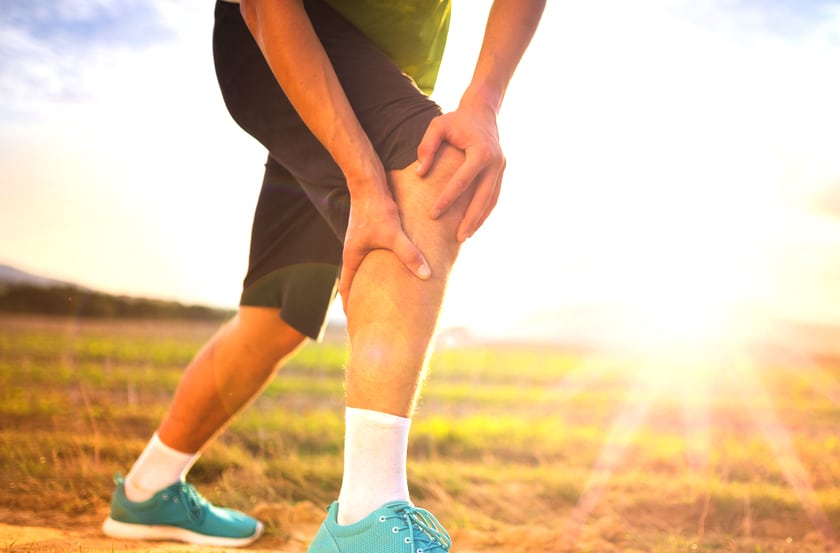Facing a severe knee injury is not only physically painful but also financially draining. When you’re unable to work and medical bills start piling up, the stress can be overwhelming. At Baker Street Funding, we understand the challenges you’re going through and are here to help. Our pre-settlement funding provides immediate financial relief, so you don’t have to settle for less than you deserve due to financial pressure.
Understanding Pre-Settlement Funding for Lawsuits Involving Knee Injuries
What is Pre-Settlement Funding?
Pre-settlement funding is a cash advance against the expected settlement of your knee injury case. It helps you cover urgent costs right now, without having to wait for your case to wrap up. And here’s the best part: it’s non-recourse. That means you only pay back the advance if you win your case. No extra financial strain if things don’t go your way.
At Baker Street Funding, we offer competitive rates and cap interest after three years, so you won’t get buried under ever-rising interest after you get your knee injury settlement. Plus, we work closely with your attorney to keep things smooth and transparent, with no hidden fees to surprise you.
How Pre-Settlement Funding Works
Getting pre-settlement funding from Baker Street Legal Funding is pretty easy:
- Start by reaching out to us—either fill out an online form or make a quick phone call, (888) 711-3599.
- We’ll then review your case. They focus on the merits of your case, not your credit score, which is a relief.
- Your attorney plays a key role here, as he or she provides the necessary documents related to your knee injury claim, and pays us if you win.
- Once you’re approved, you’ll get a funding offer outlining the terms and conditions.
- Agree to the terms, and the funds are disbursed fast—usually within 2 – 24 hours.
Use your lawsuit advance money for whatever you need—medical bills, rent, mortgage, pet care services, child care services, elder support, household help, gas and electric bills, credit card bills, or other expenses.
Seeking Compensation for Knee Injuries
Knee injuries often happen in accidents like car crashes, falls, sports injuries, and direct blows to the knee. These incidents usually result from negligent actions or conditions, such as poorly maintained premises, lack of safety measures, or reckless driving.
If you suffer a knee injury due to someone else’s negligence or intentional act, it’s your right to seek compensation for your injuries and related losses. However, knee injuries can be tricky because it involves bones, ligaments, tendons, cartilage, and bursae.
Having an ACL and PCL tears, severe meniscus tears, tibial plateau fractures, patellar fractures, femoral condyle fractures, knee dislocations, patellar dislocations, osteochondral fractures, or severe tendon tears, might require surgery to repair the damage and restore function.
Unfortunately, some of the procedures required are invasive and may also increase the risk of developing conditions like osteoarthritis, which can further affect your mobility and quality of life, making it even harder to pursue your lawsuit to its full value.
Why Legal Funding is Important for Victims of Knee Injuries
Legal proceedings for knee injuries can be lengthy and complicated due to the need to prove negligence, disputes over liability, the high stakes of compensation, and the coordination of expert testimony. Insurance companies often use tactics to delay or dispute claims, making the process even harder.
Insurers might request multiple, often unnecessary, medical evaluations to challenge the severity of the injury and dispute the need for costly treatments. Examples of these treatments include total knee replacement, osteochondral allograft transplantation, or autologous chondrocyte implantation, which are usually followed by long-term physical therapy. They may also claim that you are partly at fault for the accident (comparative negligence), which can lower your compensation.
If you, due to financial strain or emotional fatigue, fail to keep up with these demands—such as missing a deadline to submit a document or failing to provide the required proof of injury or treatment—this can weaken your case. This failure can result in a reduction in your compensation amount or even the dismissal of your knee injury case.
Legal funding can be a game-changer for knee injury victims facing financial strain while waiting for a fair settlement. It provides you with the necessary cash to pay your bills during this prolonged legal process. This support helps you pursue the full compensation you deserve without being forced into accepting a lowball offer from the insurance company.
How to Use Your Lawsuit Advance for Knee Injury Recovery
Here are some great ways you can use your lawsuit loan to enhance your knee injury recovery and improve your quality of life:
- Adaptive Sports Equipment: Purchase specialized equipment for adaptive sports and physical activities, such as custom bicycles, knee braces for certain sports, or adaptive skiing gear.
- Specialized Medical Equipment: Buy or rent essential recovery tools like continuous passive motion (CPM) machines, cryotherapy devices, or TENS units for effective pain management.
- Holistic Treatments: Access treatments like acupuncture, chiropractic care, massage therapy, yoga, tai chi, and essential oils. These methods often reduce pain and inflammation, complementing traditional medical approaches and typically not covered by insurance.
- Natural Herbs: Enhance your recovery with natural herbs such as turmeric, boswellia, ginger, or devil’s claw, known for their anti-inflammatory properties and pain relief benefits.
- New Treatments for Severe Knee Injuries: Cover travel expenses for advanced treatments or surgeries not fully covered by insurance. These may include osteochondral allograft transplantation, autologous chondrocyte implantation (ACI), platelet-rich plasma (PRP) injections, stem cell therapy, computer-assisted surgery (CAS), robotic-assisted knee surgery, custom knee implants, and meniscus transplant surgery.
- Specialized Footwear: Invest in custom orthopedic shoes or inserts to provide better support and reduce strain on your injured knee.
- Knee Walkers: Maintain mobility without bearing weight on your injured knee by using knee walkers, featuring padded knee platforms for comfort and hand brakes for control.
- All-Terrain Walkers: Equip yourself with all-terrain walkers for outdoor use on uneven surfaces, featuring large, rugged wheels to handle rough ground.
Eligibility for Knee Injury Lawsuit For Pre-Settlement Funding
To qualify for pre-settlement funding for a knee injury lawsuit, your case must have strong legal merit and be actively pursued by an attorney on a contingency fee basis. Your legal representative must also be cooperative and ready to sign the funding agreement upon approval.
On top of that, your knee injury must result from the negligence or wrongdoing of another person. The at-fault party should have adequate insurance coverage to cover your damages. Last, you must be a plaintiff living in a state where funding is available.
How We Evaluate Your Case
Depending on your state and the level of fault in the accident, fault laws (e.g., comparative fault, contributory negligence) can influence the compensation you receive. Other than the above criteria, here is how we evaluate your knee injury case:
Strong Evidence of Fault and Medical Evidence of Impact
- Evidence of the Incident. Detailed documentation, such as accident reports, witness statements, and surveillance footage, proving that the knee injury directly resulted from the incident.
- Negligence Documentation. Evidence showing a breach of safety protocols, improper conduct, or failure to maintain safe environments.
- Injury Severity Assessment. Grading of ligament tears (e.g., Grade I, II, III for ACL tears), extent of meniscal tears, or cartilage damage, directly related to the force and direction of the incident.
- Extent of Damage. Medical assessments detailing the nature and extent of the knee injury, including fractures, torn ligaments (ACL, MCL), cartilage damage, or dislocations. If arthroscopic surgery was performed, include the surgeon’s findings and photographs.
- Physical Examination. Notes on knee tests, such as the McMurray’s test, and the Apley grind test.
- Stability Tests. Results from tests assessing the stability of the knee joint, such as the Lachman test for ACL integrity or the pivot shift test.
- Patient History. Documentation of the patient’s account of the injury, including the mechanism of injury (e.g., twisting motion, direct impact).
- Imaging Studies. Includes X-rays, MRI, and ultrasounds to provide a comprehensive view of the knee’s condition.
- Range of Motion Tests. Measurements comparing the injured knee to the uninjured knee to document functional limitations and improvements over time.
Orthopedic Biomechanical Analysis
- Force Impact Analysis. Studies how external forces caused the injury, including assessments of joint stress and the mechanisms of injury (e.g., torsion, impact, compression).
- Conservative Treatments. Documentation of non-surgical treatments such as physical therapy, bracing, and injections, which help in assessing the progression and persistence of the injury over time.
- Arthritis Development. Records documenting the onset of post-traumatic arthritis or other degenerative conditions resulting from the knee injury.
- Secondary Injuries. Documentation of any additional injuries or complications arising from altered gait or changes in physical activity due to the knee injury, such as hip, back, or ankle problems.
- Independent Medical Examination (IME) Report. An unbiased assessment conducted by a reputable medical professional, evaluating the severity of the injured knee and its potential consequences for your overall health and functionality.
Causation and Long-Term Impact
- Expert Testimony. Provided by medical experts specializing in orthopedics and biomechanics to establish the causation of the injury and its long-term effects.
- MRI and X-rays. Imaging studies that clearly show the extent of damage to knee structures, including ligaments.
- Orthopedic Specialists. Testimony explaining the nature of the injury, the treatment protocols followed, and the expected outcomes over time.
- Long-term Prognosis. Expert opinions on the future outlook for the knee injury, including the potential for deterioration or the need for additional medical interventions.
- Permanent Disability. Assessment of any permanent impairments or disabilities resulting from the knee injury and their impact on your daily life and work capabilities.
- Functional Limitations. Documentation detailing how the injury affects daily activities such as walking, climbing stairs, and engaging in recreational or occupational activities.
Economic Impact
- Medical Expenses. Detailed costs for medical bills, including emergency care (ranging from $1,000 to $10,000+), knee surgeries like ACL reconstruction or meniscus repair (ranging from $10,000 to $50,000 per surgery), and expenses for physical therapy and ongoing treatments.
- Economic Experts. Testimony from economic experts is used to quantify your financial losses, including lost wages, and future care needs.
- Vocational Experts. Testimony on how your knee injury affects your ability to work, indicating the need for vocational retraining or job modifications.
Additional Factors
- Lost Wages
- Pre-Litigation Offers
- Career Impact Projections
- Jury Appeal
Take the Next Step with Baker Street Legal Funding
If you’re struggling with the financial burden of a knee injury while waiting for your lawsuit to settle, Baker Street Funding can provide the relief you need. Our pre-settlement funding offers you non-recourse funding, meaning you only repay if you win your case. This is particularly beneficial if you are dealing with debilitating pain, restricted mobility, or the inability to work due to your knee injury.
Whether you’re experiencing chronic pain, difficulty walking, or the need for ongoing medical treatments and physical therapy, Baker Street Legal Funding helps you cover all your essential costs.
Don’t let insurer delay tactics force you into a lowball settlement. Trust Baker Street Funding to support you through this challenging time. Contact us today at (888) 711-3599 to learn more about how our pre-settlement loans, featuring competitive rates and fast approval.










